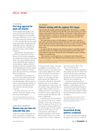 7 citations,
October 2020 in “Journal of The American Academy of Dermatology”
7 citations,
October 2020 in “Journal of The American Academy of Dermatology” People with hidradenitis suppurativa have a higher risk of heart attacks and strokes.
 37 citations,
October 2004 in “Adolescent Medicine Clinics”
37 citations,
October 2004 in “Adolescent Medicine Clinics” Bariatric surgery may help severely obese teenagers but has risks and requires careful patient selection and long-term care.
 4 citations,
January 2019 in “Therapeutic Advances in Endocrinology and Metabolism”
4 citations,
January 2019 in “Therapeutic Advances in Endocrinology and Metabolism” Medications for PCOS don't seem to raise heart disease risk.
3 citations,
February 2021 in “Pediatric rheumatology online journal” A girl with lupus and trisomy X has a higher risk of bone problems like avascular necrosis and osteoporosis.
 266 citations,
November 2013 in “European Journal of Epidemiology”
266 citations,
November 2013 in “European Journal of Epidemiology” The Rotterdam Study aims to understand disease causes in the elderly and has found new risk factors and genetic influences on various conditions.
 92 citations,
May 2014 in “The American Journal of Medicine”
92 citations,
May 2014 in “The American Journal of Medicine” The conclusion is that early diagnosis and a multi-system treatment approach are crucial for managing PCOS and its associated health risks.
 89 citations,
November 2014 in “Medical Clinics of North America”
89 citations,
November 2014 in “Medical Clinics of North America” Eating 500 fewer calories a day and making lifestyle changes can improve PCOS symptoms and reduce diabetes risk; more research is needed on its causes and treatments.
 47 citations,
February 2019 in “Journal of The American Academy of Dermatology”
47 citations,
February 2019 in “Journal of The American Academy of Dermatology” LGBT individuals have unique skin health needs, including higher STD risks and side effects from gender-affirming treatments, requiring dermatologists to offer knowledgeable and culturally competent care.
 88 citations,
May 2012 in “Human Reproduction Update”
88 citations,
May 2012 in “Human Reproduction Update” Women with PCOS may take longer to get pregnant but can have a normal family size, and should manage their overall health to reduce long-term health risks.
 11 citations,
January 2016 in “Journal of clinical & experimental dermatology research”
11 citations,
January 2016 in “Journal of clinical & experimental dermatology research” Substance abuse can cause various skin problems, including marks from injections, sores, premature aging, and increased cancer risk.
 4 citations,
June 2013 in “The Journal of Rheumatology”
4 citations,
June 2013 in “The Journal of Rheumatology” The document concludes that various findings in rheumatology offer insights into disease severity, treatment responses, and potential risks in medication, with some limitations due to unspecified participant numbers.
 March 2021 in “Clin-Alert”
March 2021 in “Clin-Alert” The FDA warned about safety issues with remdesivir and tofacitinib, finasteride is linked to suicidality, potent topical corticosteroids increase osteoporosis risk, henna can cause hemolysis in G6PD deficiency, chemotherapeutic agents can cause adverse reactions, drug interactions are common in cancer patients, ketamine can reduce at-risk drinking, high dose of anticholinergics increases dementia risk in Parkinson's patients, and prenatal exposure to second-generation antipsychotics increases pregnancy complications.
 July 2017 in “Nursing2023”
July 2017 in “Nursing2023” Actemra is approved for a specific artery condition, HIV treatment adherence has improved, women may pay more for a hair loss product, and incorrect dosing of blood thinners can be risky.
 5 citations,
December 2021 in “Physiological Research”
5 citations,
December 2021 in “Physiological Research” Men, particularly those with hair loss, are more likely to get the virus, and those with prostate cancer may have milder symptoms. Testosterone's role in the disease is unclear, and the virus doesn't seem to harm male fertility. Women with PCOS might be at higher risk. More research is needed.
 30 citations,
April 2007 in “Dermatologic Clinics”
30 citations,
April 2007 in “Dermatologic Clinics” The document concludes that new treatments are needed to better manage acne and reduce side effects related to current therapies.
 28 citations,
October 2018 in “Clinical Obstetrics and Gynecology”
28 citations,
October 2018 in “Clinical Obstetrics and Gynecology” Testosterone therapy seems safe and effective for transgender men with proper care, but more long-term research is needed.
 7 citations,
January 2019 in “Headache”
7 citations,
January 2019 in “Headache” Hormone therapy may increase migraines in transgender women and decrease them in transgender men; more research is needed on migraine management in transgender individuals.
 6 citations,
July 2013 in “Acta Clinica Belgica”
6 citations,
July 2013 in “Acta Clinica Belgica” The document concludes that combination therapy is most effective for treating excessive hair growth in women with idiopathic hirsutism, and more research is needed to understand the condition.
5 citations,
May 2018 in “Therapeutic advances in drug safety” Androgen use may increase the risk of stroke, but more research is needed.
 1 citations,
May 2015 in “Primary Health Care”
1 citations,
May 2015 in “Primary Health Care” Effective acne treatment varies by type, with topical and oral medications showing strong evidence, and patient education and support are crucial.
 81 citations,
May 2007 in “Fertility and Sterility”
81 citations,
May 2007 in “Fertility and Sterility” Testosterone therapy seems safe for postmenopausal women for a few years, but more research is needed for long-term effects.
 49 citations,
September 2012 in “The Journal of clinical endocrinology and metabolism/Journal of clinical endocrinology & metabolism”
49 citations,
September 2012 in “The Journal of clinical endocrinology and metabolism/Journal of clinical endocrinology & metabolism” The document concludes with guidance for doctors on diagnosing and treating hirsutism effectively and safely.
 29 citations,
October 2020 in “eLife”
29 citations,
October 2020 in “eLife” Higher testosterone levels can increase the risk of certain diseases like type 2 diabetes in women and prostate cancer in men, but can also protect against autoimmune diseases and hair loss. It also affects body fat and bone density.
 April 2023 in “American Journal of Transplantation”
April 2023 in “American Journal of Transplantation” Hormone replacement therapy may lower the risk of severe COVID-19 outcomes in non-immunosuppressed people and male organ transplant recipients.
 3 citations,
September 2021 in “International Journal of Molecular Sciences”
3 citations,
September 2021 in “International Journal of Molecular Sciences” Androgens and a high-fat diet may increase the risk of severe COVID-19 in women with PCOS by upregulating certain proteins in the heart and kidneys.
 10 citations,
January 2019 in “Advances in Clinical and Experimental Medicine”
10 citations,
January 2019 in “Advances in Clinical and Experimental Medicine” Certain variations in the vitamin D receptor gene are linked to an increased risk of polycystic ovary syndrome.
 1 citations,
March 2013 in “The European Journal of Contraception & Reproductive Health Care”
1 citations,
March 2013 in “The European Journal of Contraception & Reproductive Health Care” The paper suggests that France's suspension of Diane-35 was hasty and could cause treatment issues and unintended pregnancies, recommending a re-evaluation and better patient information.

Increased free testosterone can lead to stronger bones and less body fat but also higher risks of prostate cancer, hair loss, spine issues, and high blood pressure.
 15 citations,
April 2022 in “Immunology”
15 citations,
April 2022 in “Immunology” Men and women get COVID-19 at similar rates, but men tend to get sicker and have a higher risk of dying, while women usually have stronger immune responses and vaccine reactions.
 3 citations,
December 1997 in “Pediatric Clinics of North America”
3 citations,
December 1997 in “Pediatric Clinics of North America” Pediatricians should advise sexually active teens on safe sex and STD prevention, and discuss contraceptive options and their side effects.




























